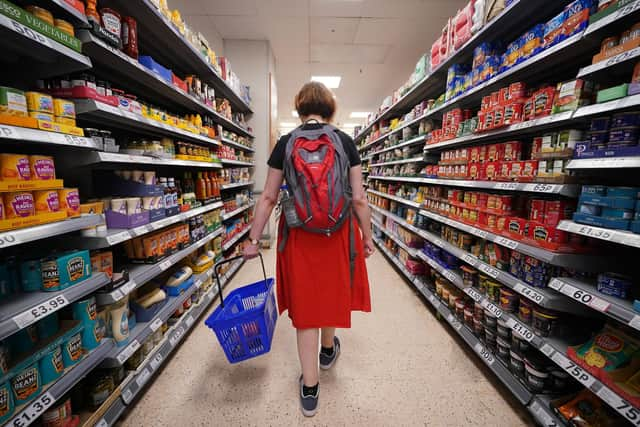Investigation from Which? finds evidence of ‘misleading’ labels in supermarkets
Which? researchers visited the UK’s biggest supermarkets and found examples of loose cauliflowers, red cabbage, courgettes and onions at Sainsbury’s, peppers, melons and mangoes at Asda and spring onions at Aldi, with no visible origin labelling on the shelf edge or the products themselves. This was despite the survey research showing that two-thirds of consumers consider it important to know where fresh fruit and vegetables come from.
A survey of 2,011 UK adults by Which? revealed that only half of shoppers said they find the current origin information presented on groceries helpful. Two-thirds said they would be more likely to buy a product labelled ‘British’ than one that was not.
Advertisement
Hide AdAdvertisement
Hide AdUnder the current origin labelling rules, it is a requirement for there to be a country or place of origin label on meat, fish, fresh fruit and vegetables, as well as honey and wine, but the rules do not generally apply to processed meat or frozen or processed fruit and vegetables. There is a requirement to provide origin labelling if it would be misleading not to.


Ele Clark, Which? retail editor, said: “Which? research has uncovered a surprising amount of inconsistent and misleading food labelling, suggesting that - even when the rules are properly adhered to - consumers aren't getting all the information they want about their food's origin.
“Shoppers want to know where their food comes from for multiple reasons, including supporting British suppliers and making more sustainable choices."
Which? also found examples of misleading signage and shelf labels in the stores it visited.
Tomatoes from Morocco, parsley from Italy and sweet mini peppers from Spain sat on a shelf under a large banner decorated with a Union Jack and the words ‘Championing Great British Quality’ at the Aldi store Which? visited.
Advertisement
Hide AdAdvertisement
Hide AdAldi’s Crestwood bacon and cheese wraps had Union Jacks and ‘Made in Britain’ on the front of the pack. However, Which? researchers felt that the flag was “misleading", as the label on the back of the pack said they were in fact made with pork from the EU.
The same was found with an Aldi steak and gravy pie.In one Asda, Which? found cauliflowers that had a Union Jack on the shelf label but were actually from Spain.
The consumer champion will be sharing its findings with the Department for Environment, Food and Rural Affairs for its consultation on fairer food labelling, which was launched on 15 March by Environment Secretary Steve Barclay.A spokesperson from Asda said: ‘We have stringent processes in place to ensure country of origin is clearly displayed at the shelf edge and on products themselves where applicable, at all our stores. We have reminded our colleagues at this particular store of these processes so that customers are able to clearly see the country of origin.”
A spokesperson from Aldi said: “We understand that our shoppers want to know where the food they buy comes from, and we work hard to ensure that all our labelling complies with the rules. We support more than 5,000 British suppliers. When it comes to fresh fruit and veg, we are proud to support British farmers and aim to stock British produce whenever it’s available. We remain firmly committed to supporting the British farming community.”
Advertisement
Hide AdAdvertisement
Hide AdA spokesperson for Iceland said: “At Iceland our products are great quality and value for customers and we follow UK Government, Department for Environment Food and Rural Affairs (DEFRA) guidance on Food labelling including country of origin.”
A spokesperson from Sainsbury’s said: ‘We have processes in place to make sure country of origin information is clearly displayed on the product or shelf and we carry out regular checks working closely with our regulator, the Animal and Plant Health Agency.’
A spokesperson for Tesco said: “We are committed to providing honest and helpful information so that customers can make an informed decision on what they wish to buy. We comply with all UK food labelling requirements, including country of origin labelling.”
Comment Guidelines
National World encourages reader discussion on our stories. User feedback, insights and back-and-forth exchanges add a rich layer of context to reporting. Please review our Community Guidelines before commenting.